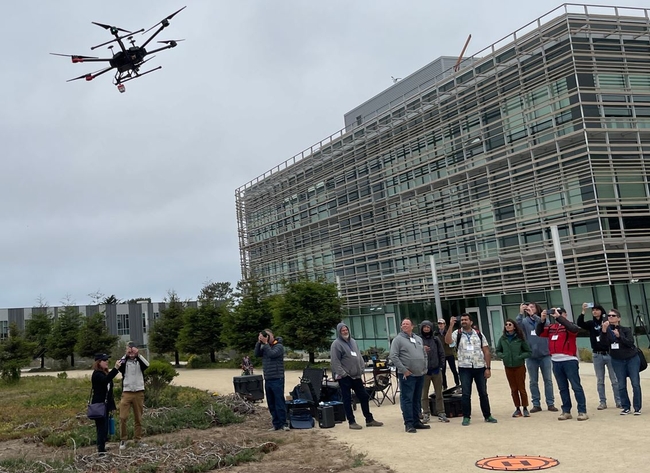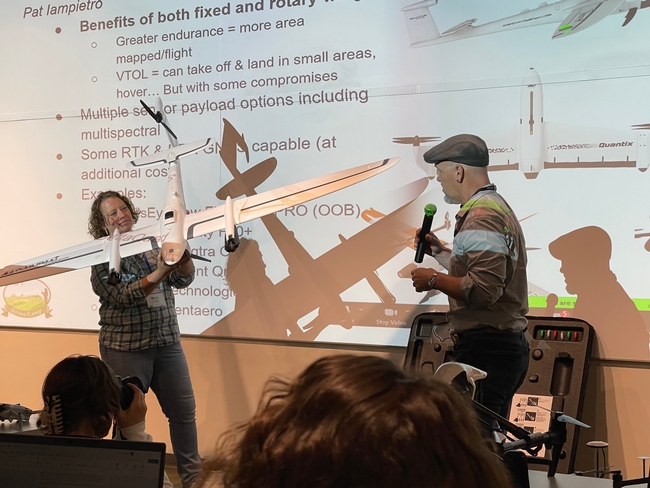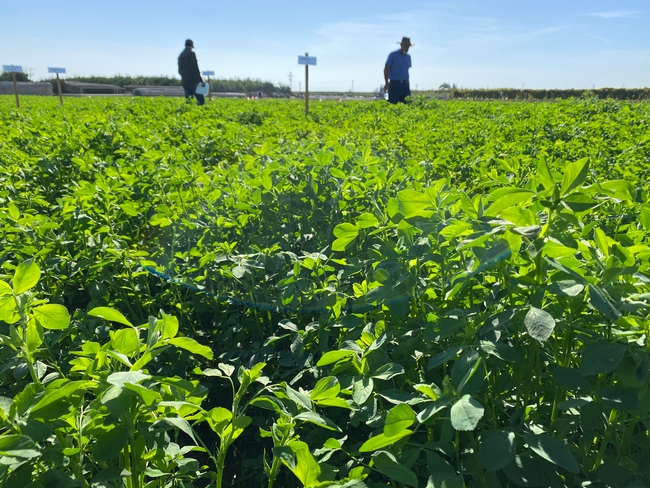Posts Tagged: innovation
Learn how to use drones to collect field data June 24-28
DroneCamp in Monterey County offers lessons in person and online
Want to learn how to use drones to map and collect field data? DroneCamp 2024 will be held at California State University, Monterey Bay in Marina on June 24-28. For people who cannot attend in person, there is also an online option available.
No experience is necessary. Training will accommodate beginners as well as intermediate users who want to learn more advanced flight, data processing and analysis skills.
Now in its 8th year, DroneCamp is a five-day short course covering everything you need to know to get started using drones for mapping and research. The curriculum covers equipment, safety and regulations, flight planning, manual and autonomous flight, photogrammetry, data processing, data analysis, data management and research talks.
New for 2024 is a concurrent track for educators. Within these breakout sessions, instructors will present topics and methods for teachers developing drone programs, and will discuss drone technology, safety culture and remote-pilot code of conduct.
DroneCamp is led by a team of 21 instructors from UCMerced, UC Santa Cruz, CSU Monterey Bay, UC Davis, UC Berkeley, UC Santa Barbara, Lakeland College, American River College and UC Agriculture and Natural Resources.
Participants attending the presentations in person will get hands-on experience in flight workshops, where they will have the opportunity to:
- Fly a variety of drone platforms
- Directly engage with instructors and other participants
- Expand their networks
- Gain access to all the software used throughout the week
- Explore the iconic Monterey Bay Area
Light refreshments, daily lunches and a Monday evening dinner social are included with in-person registrations. Participants must make their own lodging arrangements as housing is not available through campus.
Registration for in-person classes will close on June 5 or when capacity is reached. The registration fee is $1,200 for in-person participants, $700 for academics and students, and $120 for virtual participants. To register, visit https://bit.ly/DroneCamp2024.
For more information, see the agenda at https://dronecampca.org/2024-agenda, watch video highlights from 2023 or contact info@dronecampca.org.
Innovators in academia gear up for VINE Build workshops
A series of VINE Build workshops aimed at equipping academic innovators with essential pathways to bring new inventions to market is being sponsored by The VINE, an initiative of University of California Agriculture and Natural Resources (UC ANR), in collaboration with Farmhand Ventures. These workshops are designed to empower participants with the knowledge and tools necessary to navigate the complex landscape of technology commercialization.
"These workshops represent a unique opportunity for academic innovators to gain invaluable insights into the commercialization process," said Gabe Youtsey, UC ANR chief innovation officer and founder of the VINE. "By bridging the gap between academia and industry, we aim to catalyze innovation and propel advancements in technology and agriculture so we can enjoy the benefits sooner."
The half-day sessions will explore various aspects of commercialization as a mechanism for technology transfer. Led by industry experts, the workshops will cover user-centered design principles, inclusive innovation basics, the role of commercialization in technology translation, commercialization strategies, intellectual property licensing, transitioning from academia to business, and the differences between non-dilutive and dilutive funding.
"For academics looking to make a real impact, these workshops provide an invaluable platform," said Connie Bowen, co-founder and managing partner of Farmhand Ventures. "By participating in these sessions, innovators have the opportunity to turn their great ideas into tangible products that address the big challenges facing our industry today."
People involved in applied food and agriculture research – including professors, graduate students, undergraduate students and others – are encouraged to participate.
The workshops will be held across various locations in California on the following dates:
- Fresno: May 9, 8:30 a.m. - 2 p.m., Smittcamp Alumni Center, Fresno State
- San Diego: May 23, 8:30 a.m. - 2 p.m., Salk Institute Foyer, San Diego
- Davis: May 29, 8:30 a.m. - 2 p.m Physical Sciences and Engineering Library, Conference Room, UC Davis
- Santa Cruz: Date and location to be determined.
For more information and to register for the workshops, please visit: https://bit.ly/vine-build-workshop
$1.7M granted for climate-smart planning led by UC ANR scientists
In California, natural and working lands make up 95 million acres of the state and play a vital role in building resilience to the impacts of climate change. University of California Agriculture and Natural Resources was awarded $1.7 million for the California Next Generation and Equitable Climate Action Plan, as part of the state's Natural and Working Lands Climate Smart Strategy and California's 30x30 Initiative, an effort to conserve 30% of the state's lands and coastal waters by 2030.
Natural and working lands include both unmanaged and managed areas actively used for agriculture, forestry or production purposes.
Chandra Richards, UC Cooperative Extension agricultural land acquisitions academic coordinator for Southern California, and Cristina Murillo-Barrick, UCCE's Black, Indigenous and People of Color community development advisor for the Bay Area, are leading the California Next Generation and Equitable Climate Action Plan project.
To build capacity and technical assistance for climate-smart action planning, Richards and Murillo-Barrick will use the Climate Smart Land Management Program funding, awarded through the California Department of Conservation, to focus on two of the most pressing climate action issues: equitable land access and land management diversification.
According to the 2022 U.S. Department of Agriculture census, demographic data indicates that California agricultural land ownership and production is concentrated within an aging and mostly White demographic. However, research suggests diverse management practices promote healthy landscapes. This has been shown to benefit the environment, human health and climate resilience in multiple ways.
For this reason, this project centers on “historically underrepresented communities,” a term that includes California Native American Tribes, communities of color, landless farmers, immigrant and non-English speaking communities and other agency-designated minority groups (racial, ethnic and non-male groups, socially disadvantaged farmers and ranchers, and California designated severely disadvantaged communities).
Focusing on Southern California, UC Cooperative Extension scientists will identify barriers to land access, management and opportunities to increase land manager diversity. They also will engage historically underrepresented communities in coalition building, capacity assessment and climate action planning.
Within the last few decades, Californians have faced increased ecosystem stressors and decreasing diversity of natural systems. This pattern continues to damage already-vulnerable communities (disproportionately historically underrepresented communities), while also worsening and intensifying climate impacts, including drought, wildfire, flooding and disease. Overcoming these kinds of systemic and structural challenges will require the next generation of land managers to reflect California equitably, while preparing them to take on climate resilience. The project will determine clear solutions and plans that enable long-term, strategic land use and protection.
To do this work, UCCE is collaborating with the Community Alliance with Family Farms (CAFF), California Association of Resource Conservation Districts (CARCD) and the California Bountiful Foundation, all of whom serve as subgrantees and will deepen connections with communities.
Organizations like CARCD have long served as “boots on the ground” personnel and have close relationships with landowners and land managers. “RCDs have been hearing the land equity need for a long time and are actively collaborating with different partners to tackle this pressing issue,” said Qi Zhou, program manager of Justice, Equity, Diversity and Inclusion at CARCD and member of the Strategic Growth Council Land Equity Task Force.
“California RCDs are excited about this project because it will allow major California agriculture and conservation partners to collaboratively develop plans and implement projects centering on equity land access and land management diversification,” Zhou added.
Project lead Richards said $270,000 of the grant will be reserved for new partnerships with organizations in Southern California that have experience with, and strong ties to, historically underserved communities.
UC ANR is collaborating with the California Department of Food and Agriculture as well as California Climate and Agriculture Network (CalCAN), and World Be Well, a Southern California nonprofit.
Tawny Mata, CDFA's director of the Office of Environmental Farming and Innovation, described technical assistance providers as being grounded in their local agricultural communities and recognized their importance to partners in the success of CDFA's incentive programs.
“When we do succeed in reaching historically underserved farmers and ranchers with our grant programs, it is often with the thoughtful support and planning of a technical assistance provider,” Mata said. “I look forward to this project helping us refine our own technical assistance funding programs and bringing technical assistance providers together to network and share best practices for improving land access and promoting climate-smart agriculture.”
“The successes of this project will elevate the voices of historically underrepresented communities, strengthening efforts in these communities to support climate action,” said Richards. Additionally, the project will increase sharing of regional reports, needs assessments and community plans surrounding climate-smart management practices. Finally, it will boost technical assistance for these groups specifically.
To learn more about the Climate Smart Land Management Program and this year's awardees, visit:
Farm Robotics Challenge launches 2024 college competition
Students must form teams by Oct. 31; proposals due Nov. 15
Registration is now open for college teams competing in the 2024 Farm Robotics Challenge and proposals are due Nov. 15. The collegiate competition is organized by The VINE, an initiative of University of California Agriculture and Natural Resources, in collaboration with farm-ng, F3 Innovate and AI Institute for Next Gen Food Systems.
The Farm Robotics Challenge is an annual event where teams of students from universities and colleges across the United States tackle real-world farming challenges. The competition focuses on small-farm applications and leverages the state-of-the-art Amiga robot to integrate robotics into agricultural research. This year, the challenge is expanding by introducing a new division for two-year colleges, to allow more students to participate.
“The Farm Robotics Challenge is not just another competition; it's a transformative experience designed to cultivate the next generation of leaders in agricultural technology,” said Gabe Youtsey, UC ANR chief innovation officer and founder of The VINE. “By participating in this challenge, students are not only showcasing their technical skills, but also contributing to a larger mission — advancing sustainable and efficient farming practices for the future. We're incredibly excited to see the solutions that these young entrepreneurs will bring to the table.”
Teams are expected to address a variety of production farming topics, which can range from any crop or size of farm. The challenges for the competition are categorized into three main areas: Autonomy, which includes course navigation; Artificial Intelligence, focusing on vision and sensing as well as dataset collection; and Attachment, which involves the development of devices that can be attached to the robot for farm tasks..
“We're proud to join forces with the University of California Agriculture and Natural Resources for the second annual Farm Robotics Challenge," said Ethan Rublee, CEO of farm-ng. "With our Amiga robotics platform, our aim is to not only inspire the next wave of agricultural innovation, but also to prepare the workforce that will bring these innovations to life.”
Judging for the competition will be based on a range of criteria including the accuracy and completeness of the project, the elegance and ease of use in the design, safety measures, interdisciplinary inclusion, societal and economic impact, cost considerations, and the commercial and market potential of the solution.
The competition will consist of two main parts: market research, project proposal and fundraising; followed by development, coding and fabrication. Key dates include:
- Team formation deadline: Oct. 31
- Project proposal submission deadline: Nov. 15
- Development start: Jan. 31, 2024
- Judging: Sept. 6, 2024
Interested students, universities and investors are encouraged to visit the official Farm Robotics Challenge website at www.farmroboticschallenge.ai to fill out interest forms and get involved. The website also features detailed information about the challenges and judging criteria.
About The VINE
The VINE, an initiative of University of California Agriculture and Natural Resources, is California's agriculture, food, and biotech innovation network. Our mission is to harness the power of open innovation to help industries and entrepreneurs grow and scale globally while catalyzing technology innovation and commercialization for productive, sustainable and equitable food systems.
About AIFS
Established on Oct. 1, 2020, the Artificial Intelligence Institute for Next Generation Food Systems, or AIFS, aims to solve the world's biggest challenges to crop and food production facing our planet: ensuring a sustainable, nutritious, efficient and safe food supply while mitigating the impacts of climate change.
About farm-ng
Based in Watsonville, farm-ng is building general purpose off-road robotics hardware and software products. The company's mission is to transform the food system by democratizing access for the smallest farmer to cutting-edge robotics technology.
About F3 Innovate
Headquartered in California's Central Valley, F3 Innovate is the U.S. epicenter for climate-smart agrifood tech. With proximity to over 13,650 farms and 5 million acres of farmland, we collaborate with top research institutions to advance industry research and development. Supported by federal and state funding, F3 Innovate is geared to shape the future of sustainable food production worldwide.
The VINE announces call for startups to apply for field-trial support
Validation of Innovation Program provides supportive ecosystem for startups
The VINE, an initiative by the University of California Agriculture and Natural Resources, is now accepting applications for its VINE Validation of Innovation Program. The program aims to support innovation in the agri-tech sector, particularly in climate-resilient solutions for California food systems.
Made possible with support from a UC Climate Action grant, the program is inviting startups to apply, with a focus on providing comprehensive support for field trials – a critical stage for any agri-tech venture.
"Field trials are vital for validating new innovations in the agri-tech sector,” said Gabe Youtsey, chief innovation officer with UC ANR and founder of The VINE. “The VINE VIP aims to provide a supportive environment for carrying out these essential tests, bridging the gap between innovative concepts and real-world application."
Elif Ceylan, co-founder of OpenGate Partners and head of the VINE VIP, also stressed the importance of field trials.
"Field trials serve as a crucial phase where promising ideas either succeed or require adjustment,” Ceylan said. “We are committed to prioritizing this stage to ensure the effectiveness and relevance of emerging agri-tech solutions."
The VINE VIP offers more than field trials. It provides a supportive ecosystem for startups, including industry connections, access to a broad network of farmers and experts, comprehensive validation results and market entry support. The program is a unique accelerator that pairs startups with project partners in the agri-tech industry, facilitating Proof of Concept projects and commercialization trials for industry-defined challenges in California agriculture.
By connecting startups with farmers, academics and industry experts, the program aims to validate, advance, adopt and amplify innovative technologies, reducing technological risks and accelerating sales through its extensive industry network.
Startups interested in joining the VINE VIP can apply until Sept. 16, 2023. Detailed information about the program and the application process is available on The VINE's website at thevine.io/vip.
The VINE is an initiative of the University of California Agriculture and Natural Resources, dedicated to fostering agriculture, food, and biotech innovation in California. Our mission is to support industries and entrepreneurs while promoting technology innovation and commercialization for sustainable and equitable food systems. We connect entrepreneurs with public and private sector resources, encourage collaborations to address industry challenges, and promote regional capacity for global innovation as an economic opportunity.






